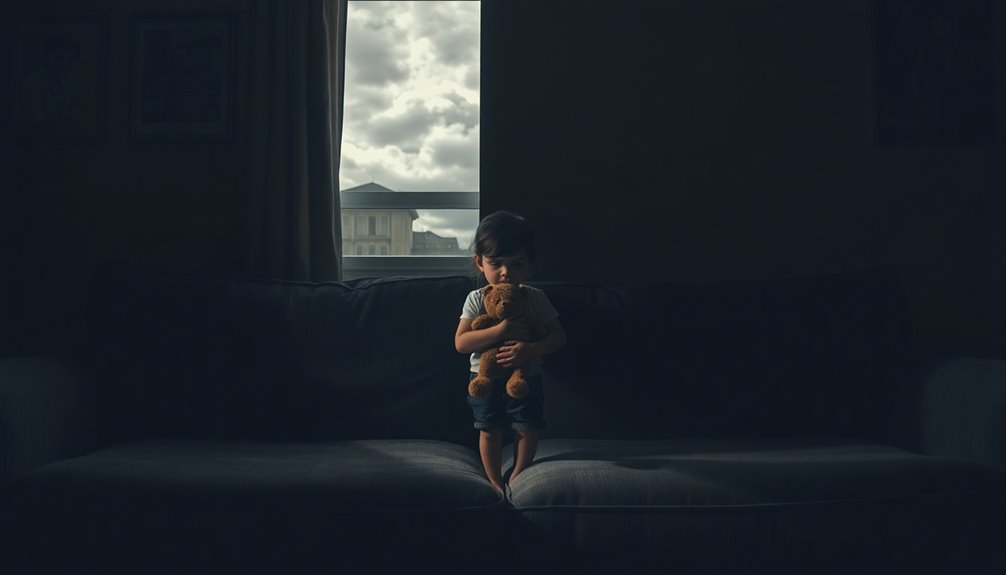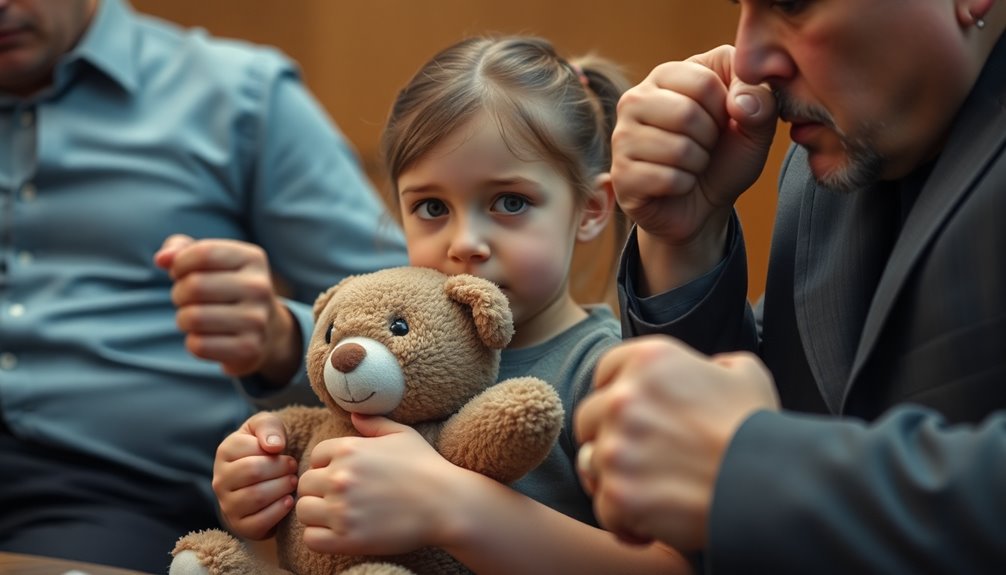In a child’s custody battle, your child faces emotional turmoil, as family conflicts and frequent moves disrupt their sense of stability and trust. Parental manipulation and high-conflict disputes can intensify sibling rivalry and feelings of insecurity. Rapid changes to routines and inconsistent support worsen emotional distress. Understanding how parental behavior and legal decisions impact your child’s well-being can help you prioritize their needs. Staying informed will guide you through the complexities and help protect your child’s future.
Key Takeaways
- A child’s experience in custody battles involves navigating frequent transitions, emotional confusion, and the impact of parental conflict.
- Parental manipulation and high-conflict disputes can undermine a child’s sense of security and emotional well-being.
- Stability, routine, and honest communication are crucial to help children cope with custody changes.
- Legal decisions prioritize the child’s best interests, often focusing on emotional health and stability over parental preferences.
- Children may develop trust issues, anxiety, or sibling rivalry as a result of ongoing family conflicts and custody arrangements.
The Child’s Early Memories and Family Bonds

In the child’s early memories, family bonds are often fragile and fleeting, especially when parents are separated. You might recall moments of childhood nostalgia, feeling the warmth of family during happier times. These memories contrast sharply with current emotional distress, making you long for a sense of closeness that feels lost. You notice how family bonds once felt strong but now seem distant or broken. The memories of shared laughter and love fade into confusion as you grapple with the reality of separation. These early impressions shape how you perceive your family and influence your emotional development, often leaving you torn between past happiness and present turmoil. Additionally, understanding family bonds can help in processing these complex emotions during such challenging times. Recognizing the importance of emotional connections can provide guidance on navigating feelings of loss and rebuilding trust.
Navigating the Emotional Turmoil of Family Conflicts

Family conflicts create a whirlwind of emotions that can be overwhelming for children caught in the middle. You might feel torn between parents, influenced by sibling rivalry or cultural expectations. To cope, consider these factors:
Family conflicts can be overwhelming; stay aware and prioritize your well-being.
- Recognize how sibling rivalry heightens emotional tension, making conflicts feel even more personal.
- Understand cultural influences shape your perceptions and reactions, adding complexity to family disputes.
- Maintain focus on your well-being by setting boundaries and seeking support when conflicts escalate.
- Paying attention to your emotional resilience can help you navigate difficult family situations more effectively. Developing skills in emergency preparedness and understanding your environment can also provide a sense of security amidst turmoil.
Being aware of family dynamics can help you better comprehend the underlying causes of conflicts and find healthier ways to cope. Recognizing how communication patterns influence family interactions can further assist in managing ongoing tensions. Additionally, understanding the power dynamics within your family can shed light on the roots of disagreements and foster more effective ways to address them. Navigating these challenges requires awareness of underlying tensions and influences. Staying grounded helps you manage feelings of confusion, anger, or sadness amid ongoing family turmoil.
The Impact of Alternating Custody on a Child’s Sense of Stability

Alternating custody markedly disrupts a child’s sense of stability by forcing constant shifts between two homes. This often leads to heightened sibling rivalry, as children compete for attention and reassurance in unfamiliar environments. Parental favoritism can deepen feelings of insecurity, making children feel torn or less valued. The frequent changes challenge your child’s ability to develop routines and trust, resulting in confusion and emotional distress. They might struggle to settle or form lasting relationships, feeling caught between contrasting parental worlds. Additionally, this instability can hinder a child’s financial stability as they may face challenges in establishing consistent routines around resources and support. Moreover, the lack of a consistent environment can negatively impact their emotional development, leading to difficulties in managing feelings and building resilience. The ongoing instability also hampers a child’s ability to build trust with caregivers and peers, which is essential for healthy social development. Frequent moves can also disrupt their sense of security, making it harder for them to feel safe and protected in their daily lives. This ongoing instability can also impact their long-term well-being, as the cumulative stress may have lasting effects. Overall, this ongoing instability hampers their sense of security, affecting emotional growth and long-term well-being.
Manipulation and the Role of Parental Disputes

How do parents manipulate custody disputes to influence their children? They often use emotional manipulation to sway perceptions, making children feel guilty or torn. Parental control becomes evident when one parent undermines the other, planting doubts about loyalty or love. Common tactics include:
- Spreading false or selective stories to shape the child’s view
- Guilt-tripping children into choosing one parent over the other
- Withholding affection or threatening to withhold contact to enforce compliance
- Using skincare patches as a metaphor for how external influences can impact a child’s emotional well-being and skin health. These tactics can also involve exploiting family dynamics to deepen the child’s confusion and attachment issues. Recognizing these patterns is vital to understanding how emotional manipulation can erode a child’s sense of security, making them more susceptible to influence and less able to trust their own feelings. Additionally, understanding parental influence helps in identifying and counteracting such manipulative behaviors. These strategies deepen confusion, weaken the child’s sense of security, and manipulate their feelings to serve parental agendas. Furthermore, being aware of child development stages can help in recognizing age-appropriate responses and vulnerabilities. Understanding these tactics is essential for safeguarding the child’s emotional well-being.
How Rapid Changes Disrupt Childhood Routine and Security

Frequent and unpredictable changes in custody arrangements can considerably disrupt a child’s daily routine, making it hard to feel secure. These abrupt shifts often lead to confusion and emotional distress, fueling sibling rivalry as children struggle to adapt. Custody mediation, while intended to help, sometimes intensifies the instability if plans keep changing. Children may forget belongings, miss social opportunities, or feel torn between homes. These constant alternatives prevent them from establishing a stable sense of normalcy, increasing anxiety and insecurity. Without consistent routines, kids find it harder to trust their environment, impairing emotional development and deepening feelings of insecurity. Additionally, the irregular schedule can interfere with a child’s ability to maintain a stable vacuum cleaner performance, which is essential for a clean and healthy living space. The lack of routine can also impact their educational stability, disrupting learning and social interactions. Moreover, frequent changes can hinder their ability to develop emotional resilience, which is vital for navigating life’s challenges. Recognizing the importance of family stability can help caregivers create supportive environments despite the upheaval.
The Hidden Psychological Effects of Custody Arrangements

Custody arrangements can subtly but profoundly influence a child’s mental health, often in ways that aren’t immediately visible. You might notice increased anxiety, trust issues, or emotional withdrawal stemming from ongoing conflicts or instability. These arrangements can hinder parental reconciliation, leaving unresolved resentment that affects your child’s sense of security. Additionally, sibling rivalry may intensify as children compete for attention or feel torn between parents. Such dynamics can cause long-term issues like attachment difficulties, emotional dysregulation, and feelings of abandonment. Recognizing these hidden effects helps you understand that custody isn’t just about physical locations; it deeply shapes your child’s psychological well-being. Understanding anime culture and storytelling can also provide insights into emotional expression and empathy, which are vital for supporting children through these challenges. Moreover, applying mindset techniques can help parents foster a more positive environment despite difficult circumstances.
Parental Behavior and Its Influence on Child Well-being

Parental behavior plays a crucial role in shaping a child’s emotional health and sense of security. Parental manipulation and toxic parental influence can deeply affect your child’s well-being. When parents use harsh tactics, emotional outbursts, or distort memories, they create confusion and insecurity. Manipulative parents may exploit custody arrangements to control or influence your child, undermining trust and stability. This toxic influence can cause anxiety, attachment issues, and long-term emotional difficulties. Your child’s perception of themselves and their relationships depends heavily on how you behave. Consistent, respectful, and nurturing behavior fosters resilience, while toxic patterns can lead to lasting harm.
Legal Strategies and the Importance of Child-Centric Decisions

Legal strategies in child custody cases must prioritize the child’s best interests above all else. You should understand how custody laws guide decisions, emphasizing stability and emotional well-being. Effective legal advocacy focuses on presenting clear evidence of the child’s needs and preferences, especially when they’re old enough to express them. To deepen your approach, consider:
- Building a thorough case highlighting the child’s emotional and developmental needs
- Advocating for custody arrangements that foster stability and avoid high-conflict models
- Ensuring court decisions align with the child’s long-term well-being, not parental disputes or control.
Child-centric decisions are essential to protect the child’s rights and future happiness.
Challenges Faced by Children in High-Conflict Custody Battles

Children caught in high-conflict custody battles often experience intense emotional turmoil as they navigate unpredictable and often contradictory situations. You may face sibling rivalry, feeling torn between siblings or vying for parental attention. Cultural differences can amplify confusion, as conflicting traditions or expectations clash. These challenges create a sense of instability, making it hard to trust or feel secure. The table below highlights key struggles:
| Challenge | Impact | Response |
|---|---|---|
| Sibling rivalry | Increased tension, jealousy | Support open communication |
| Cultural differences | Identity confusion, alienation | Embrace diversity, understanding |
| Emotional instability | Anxiety, insecurity | Seek stability, reassurance |
Supporting Children Through Family Transitions

Managing family transitions can be challenging, especially when children face frequent moves between homes. You can support them by establishing routines that provide stability, reducing sibling rivalry, and encouraging open communication. To deepen your support, consider:
- Creating consistent daily schedules to foster security and improve academic performance.
- Facilitating honest conversations about feelings to help children process emotions.
- Encouraging siblings to resolve conflicts calmly, minimizing rivalry and tension. These strategies help children adapt better, maintain emotional health, and succeed academically despite ongoing family changes. Remember, stability and understanding are key during these turbulent times.
Frequently Asked Questions
How Can Children Express Their Feelings Safely During Custody Disputes?
You can help children express their feelings safely by encouraging art therapy, where they draw or create to share emotions indirectly. Peer support groups also provide a safe space for children to talk openly with others who understand their experience. These methods allow children to process complex feelings about custody disputes without fear, fostering emotional expression and healing in a supportive environment.
What Signs Indicate a Child’s Emotional Distress From Custody Arrangements?
Did you know that nearly 60% of children show signs of emotional distress from custody arrangements? You might notice behavioral changes like increased aggression, withdrawal, or tantrums. Academic decline is another key indicator, as kids struggle to focus or lose interest in school. If your child exhibits these signs, it’s a clear signal they’re feeling overwhelmed or unstable, highlighting the need for support and a more consistent environment.
How Does Parental Alienation Affect a Child’s Long-Term Mental Health?
Parental alienation can considerably harm your child’s long-term mental health by undermining their emotional resilience and attachment security. When they’re manipulated or pushed away from one parent, they may develop trust issues, anxiety, or depression. You might notice difficulties forming stable relationships later. To protect their well-being, it’s essential to foster open communication, support their feelings, and guarantee they feel secure and loved, regardless of custody challenges.
What Role Do Schools and Teachers Play in Supporting Children in Custody Conflicts?
You can support children in custody conflicts through educational advocacy and by participating in teacher training. Teachers, when properly trained, recognize signs of emotional distress caused by family instability. They create a safe environment, offer emotional support, and communicate effectively with children. Advocating for tailored school strategies helps children feel understood and secure, reducing their stress. Your proactive approach guarantees children receive the understanding and stability they need during challenging custody situations.
How Can Parents Collaborate Effectively to Minimize Trauma for Their Children?
To minimize trauma, you should focus on shared parenting and effective communication. Keep discussions respectful and consistent, prioritizing your child’s needs over personal conflicts. Work together to create a stable routine, exchange relevant information, and avoid involving your child in disputes. By cooperating and maintaining open, honest dialogue, you help your child feel secure and loved, reducing emotional distress and fostering a healthier environment for their development.
Conclusion
As you navigate this turbulent journey, remember that your child’s inner world holds stories you may never fully see. Every change, every conflict, shapes their sense of security and trust. Will you prioritize their emotional safety above all else? The path ahead is uncertain, but your compassion and awareness can make all the difference. In the end, it’s their innocence and future that hang in the balance—waiting for your next compassionate move.










